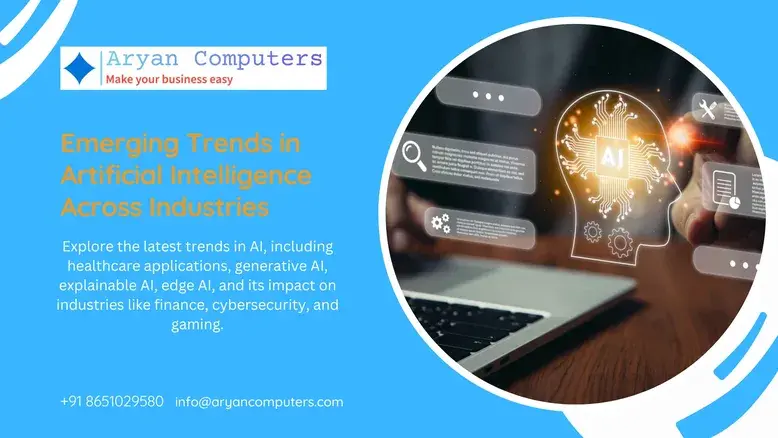Artificial Intelligence (AI) is revolutionizing industries, from healthcare to gaming, by introducing advanced technologies that were once the domain of science fiction. Let’s explore some of the most impactful AI trends shaping the future.
1. AI in Healthcare
AI is enhancing patient care through applications like predictive diagnostics, robotic surgeries, and personalized medicine. Machine Learning (ML) algorithms analyze vast medical datasets to detect diseases at early stages, while AI-driven platforms improve operational efficiency in hospitals.
2. Generative AI
Generative AI, such as tools like GPT and DALL-E, is enabling the creation of text, images, and even music. This innovation is particularly impactful in creative industries, content generation, and virtual environments.
3. Explainable AI (XAI)
Explainable AI ensures transparency by making AI decisions interpretable for humans. This is critical in sectors like healthcare and finance, where understanding AI logic can build trust and ensure compliance with regulations.
4. Edge AI
Edge AI processes data locally on devices rather than relying on centralized cloud systems. This minimizes latency, enhances privacy, and enables real-time decision-making in IoT devices and autonomous vehicles.
5. AI-Powered Automation
AI is streamlining business operations by automating repetitive tasks, from data entry to customer support. This not only boosts productivity but also reduces operational costs.
6. Natural Language Processing (NLP)
NLP enables machines to understand and respond to human language. Applications include chatbots, virtual assistants, and sentiment analysis tools that are reshaping communication and customer interaction.
7. AI Ethics and Regulation
As AI systems become more pervasive, ethical considerations and regulations are gaining importance. Addressing bias, ensuring data privacy, and maintaining accountability are central to responsible AI development.
8. AI in Finance
AI enhances fraud detection, risk management, and customer personalization in finance. Predictive analytics and robo-advisors are transforming how financial institutions operate.
9. AI in Cybersecurity
AI strengthens cybersecurity by detecting threats and preventing cyberattacks in real-time. It analyzes patterns to identify vulnerabilities and provides proactive solutions to safeguard digital assets.
10. AI and IoT (AIoT)
The integration of AI with IoT devices is creating smarter systems. AIoT enables real-time data processing and decision-making, revolutionizing industries like manufacturing, transportation, and home automation.
11. AI for Climate Change
AI contributes to environmental sustainability by optimizing energy usage, predicting natural disasters, and supporting climate research. Innovations like smart grids and precision agriculture are helping combat climate change.
12. Conversational AI
Conversational AI powers advanced chatbots and voice assistants that enhance user experiences. These systems are becoming increasingly sophisticated, offering human-like interactions in customer service and beyond.
13. AI-Driven Personalization
AI algorithms analyze user behavior to deliver personalized experiences. From tailored product recommendations to individualized marketing campaigns, personalization is redefining customer engagement.
14. AI in Gaming
AI is transforming gaming by creating realistic environments, adaptive gameplay, and intelligent NPCs (non-playable characters). This enhances player immersion and redefines the gaming experience.
Conclusion
AI is a game-changer, driving innovation and efficiency across industries. As these trends evolve, the potential for AI to positively impact our lives becomes increasingly evident. However, ensuring ethical practices and addressing challenges like bias and data privacy will be key to harnessing its full potential.

